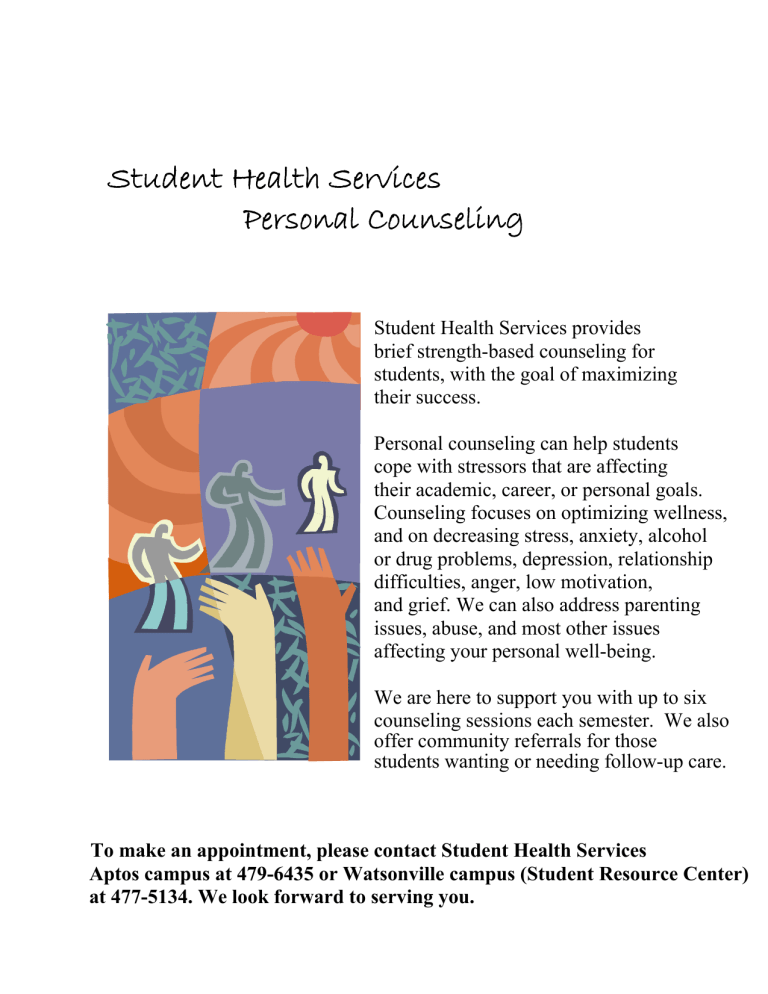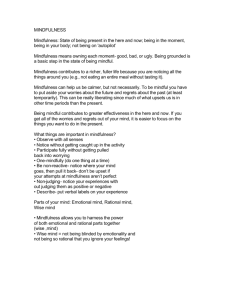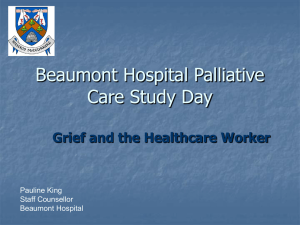Student Health Services Personal Counseling

Student Health Services
Personal Counseling
Student Health Services provides brief strength based counseling for students , with the goal of maximizing their success.
Personal c ounseling can help students cope with stressors that are affecting their academic, career, or personal goals.
Counseling focuses on optimizing wellness, and on decreasing stress, anxiety, alcohol or drug problems, depression, relationship difficulties, anger, low motivation, and grief. We can also address parenting issues, abuse, and most other issues affecting your personal well being.
We are here to support you with up to six counseling sessions each semester. We also offer community referrals for those students wanting or needing follow-up care.
To make an appointment, please contact Student Health Services
Aptos campus at 479-6435 or Watsonville campus (Student Resource Center)
at 477-5134. We look forward to serving you.
Vital Signs
"Mindfulness" Can Help Calm Stress
Today's pressure-cooker society takes a toll on everyone, but practicing "mindfulness" can help people cope with the stresses of daily life. At UCLA, the Mindful Awareness Research
Center (MARC) helps individuals learn how to better deal with stress, improve their attention span and gain an overall sense of well-being.
"We live in a very attention-deficit culture, with little time to really focus on any one thing," says Susan Smalley, Ph.D., founder and director of MARC in the UCLA Semel
Institute of Neuroscience and Human Behavior. "But these practices of mindful awareness, or mindfulness, really do open up time and give a person the perception and feeling that they have more time." The result, Dr. Smalley says, is not only a greater sense of selfawareness and inner peace, but also a greater connection to others and to community. "It is a natural outgrowth of becoming more 'present' in your daily life that you enjoy the company of others," she says.
In addition to providing benefits in one's daily life, researchers have verified the positive effects of mindfulness in a number of settings, points out Michael Irwin, M.D., director of the Cousins Center for Psychoneuroimmunology in the UCLA Semel Institute. Studies have found, for example, that such practices can play a significant role inimproving a person's immune response following cancer, heart disease or arthritis.
Mindfulness practice has been used to help treat a variety of behavioral and psychiatric disorders, such as attention deficit hyperactivity disorder, obsessive-compulsive disorder, depression and anxiety. Mindful awareness, a 2,500-year-old practice, is the moment-bymoment awareness of one's thoughts, feelings and actions and drawing inferences from one's own physical, mental and emotional experiences. Mindful awareness practices include meditation, yoga, tai chi, qui gong and other approaches designed to increase attention and foster a sense of calm. It can be seamlessly introduced into other physical and creative endeavors such as dance, art and music.
"These very simple practices teach us how to slow down, and can produce incredible results," says Diana Winston, director of mindfulness education for MARC. To introduce mindful awareness to people's lives, MARC has launched a series of classes that are open to the community. For information, visit www.marc.ucla.edu


